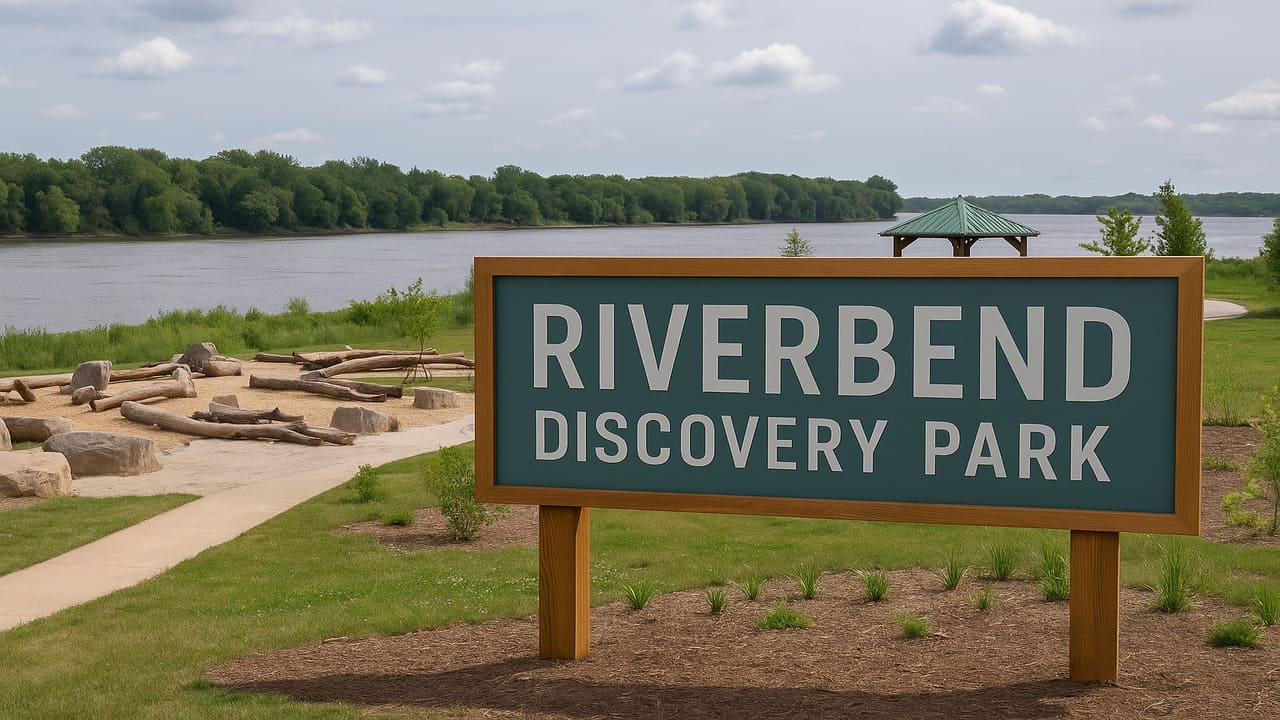
Meet Muscatine – Riverbend Discovery Park offers something rare in today’s fast-paced world: space to breathe, room to explore, and the perfect environment for learning through play. Designed with families in mind, the park is a celebration of the outdoors where kids can climb, splash, and discover, and where adults can relax in nature’s embrace.
More than just a place to picnic or walk trails. Riverbend Discovery Park is a curated experience that blends recreation, education, and environmental awareness into one accessible, family-centered destination.
At the heart of Riverbend Discovery Park is its natural playscape a vast outdoor space crafted to mimic and celebrate the natural features of Iowa’s landscape. Instead of traditional jungle gyms or plastic slides, kids interact with boulders, logs, sand, and water features. They build forts from sticks, balance on wooden beams, and wade through shallow creeks, all under the watchful eye of nature-minded design.
This approach fosters creativity, encourages movement, and helps children develop confidence and resilience. It’s a place where mud isn’t messy it’s magical.
Parents often report how their children’s attention shifts from screens to stones, from buttons to bugs. The park doesn’t just entertain it inspires curiosity and invites discovery.
Also Read : Blackpink Kicks Off DEADLINE Tour with New Song “Jump”
True to its name, Riverbend Discovery Park is a place of learning. The park offers interpretive signs and interactive exhibits scattered along its trails. Introducing visitors to the region’s native plants, migratory birds, and rich river ecosystem.
There’s also the River Lab, a small open-air pavilion where weekly programs are hold from junior ranger workshops and birdwatching tutorials to family-friendly science experiments involving soil, water, and plant life. These programs, host in collaboration with local educators and conservation groups, are design to make environmental education approachable and fun.
The goal is simple: help children understand the world around them and build a relationship with nature that lasts a lifetime.
Riverbend Discovery Park isn’t just for young explorers. The space is thoughtfully laid out to accommodate multigenerational visitors. Wide, stroller-friendly trails wind through shaded woods and open meadows, offering benches and picnic areas along the way. There’s even an accessible treehouse lookout point that provides panoramic views of the riverbend a favorite for birdwatchers and photographers alike.
For families looking to spend a full day, the park offers well-maintained restrooms, water refill stations, and shaded eating areas with grills. Weekend food trucks and seasonal farmers’ markets often make an appearance. Creating a community feel that brings together locals and visitors.
Also Read : Friday Nights at Riverside Amphitheater: Live Music with a River View
One of Riverbend Discovery Park’s standout features is its commitment to sustainability. The entire park was develope with eco-conscious principles in mind. Native plants are use for landscaping to reduce water usage and support pollinators. Solar-powered lights line the main trails, and composting toilets help reduce environmental impact.
More importantly, the park serves as a living classroom for conservation. Its wetland boardwalk educates visitors about water quality and stormwater filtration. A restored prairie area showcases Iowa’s disappearing tallgrass ecosystem. Through thoughtful design and storytelling, the park subtly teaches visitors how even small actions can contribute to a healthier planet.
With strong community support and growing popularity, Riverbend Discovery Park is already looking toward the future. Plans are underway to add a Children’s Garden a hands-on horticulture zone where kids can grow, harvest, and taste vegetables they plant themselves.
There are also proposals for a seasonal River Light Festival. Where lanterns float down the Mississippi to mark the summer solstice. This event would blend art, music, and environmental storytelling, illuminating the park in a new and enchanting way.
Discussions with local schools suggest more integration with outdoor classrooms and field trips, positioning the park not only as a recreation space, but as a vital piece of the educational ecosystem.